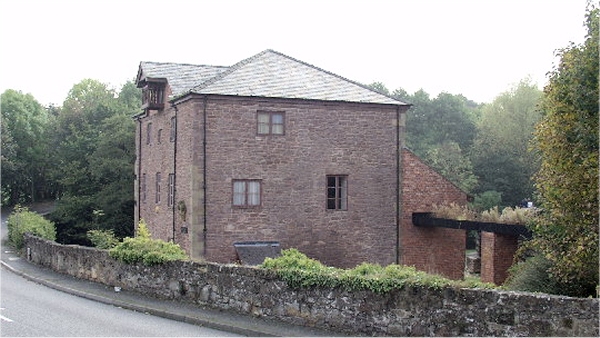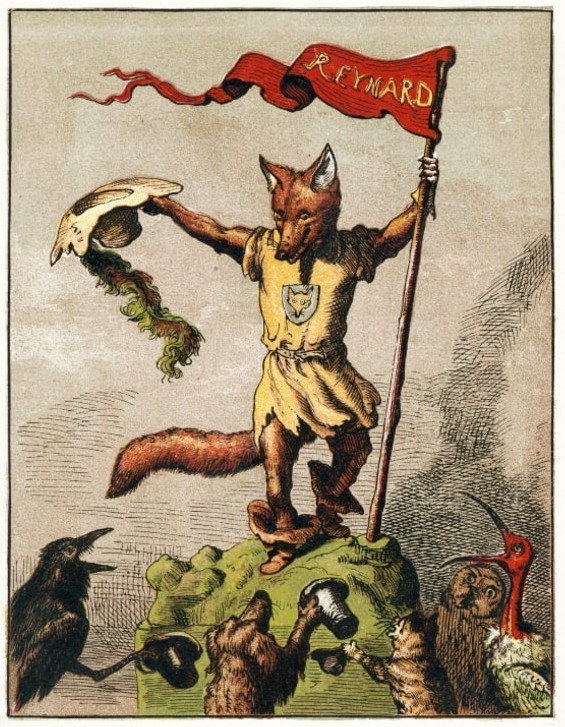|
Jack Mary Ann
Jack Mary Ann is a folk hero whose legendary exploits in the Wrexham area of Wales in the 1920s and 1930s are celebrated in a series of jokes and tales transmitted in local oral tradition. Jack was a coal miner. Jack's nickname comes from the common practice of distinguishing local men (in an area known for its poverty of surnames) by the use of the wife's Christian or given name. Jack may be considered an archetypal trickster figure and the tales involve his various intrigues with hostile authority figures such as landlords, bailiffs and employers. His legendary activities celebrate his fecklessness and irresponsibility. Jack's quick tongue does not generally save him from the consequences of his actions but provides an ironic commentary on his plight and on the values of more respectable citizens. The popularity of the Jack Mary Ann tales may suggest an undercurrent of local opposition to the respectable and supposedly dominant norms of non-conformist Christianity generally held to ... [...More Info...] [...Related Items...] OR: [Wikipedia] [Google] [Baidu] |
Folk Hero
A folk hero or national hero is a type of hero – real, fictional or mythological – with their name, personality and deeds embedded in the popular consciousness of a people, mentioned frequently in folk songs, folk tales and other folklore; and with modern trope status in literature, art and films. Overview Although some folk heroes are historical public figures, many are not. The lives of folk heroes are generally fictional, their characteristics and deeds often exaggerated to mythic proportions. The folk hero often begins life as a normal person, but is transformed into someone extraordinary by significant life events, often in response to social injustice, and sometimes in response to natural disasters. One major category of folk hero is the defender of the common people against the oppression or corruption of the established power structure. Members of this category of folk hero often, but not necessarily, live outside the law in some way. See also * List of folk ... [...More Info...] [...Related Items...] OR: [Wikipedia] [Google] [Baidu] |
Wrexham
Wrexham ( ; cy, Wrecsam; ) is a city and the administrative centre of Wrexham County Borough in Wales. It is located between the Welsh mountains and the lower Dee Valley, near the border with Cheshire in England. Historically in the county of Denbighshire, and later the county of Clwyd in 1974, it has been the principal settlement of Wrexham County Borough since 1996. Wrexham has historically been one of the primary settlements of Wales. At the 2011 Census, it had an urban population of 61,603 as part of the wider Wrexham built-up area which made it Wales's fourth largest urban conurbation and the largest in north Wales. The city comprises the local government communities of Acton, Caia Park, Offa and Rhosddu. Wrexham's built-up area extends further into villages like Bradley, Brymbo, Brynteg, Gwersyllt, New Broughton, Pentre Broughton and Rhostyllen. Wrexham was likely founded prior to the 11th century and developed in the Middle Ages as a regional centre for t ... [...More Info...] [...Related Items...] OR: [Wikipedia] [Google] [Baidu] |
Oral Tradition
Oral tradition, or oral lore, is a form of human communication wherein knowledge, art, ideas and cultural material is received, preserved, and transmitted orally from one generation to another. Vansina, Jan: ''Oral Tradition as History'' (1985), reported statements from present generation which "specifies that the message must be oral statements spoken, sung or called out on musical instruments only"; "There must be transmission by word of mouth over at least a generation". He points out, "Our definition is a working definition for the use of historians. Sociologists, linguists or scholars of the verbal arts propose their own, which in, e.g., sociology, stresses common knowledge. In linguistics, features that distinguish the language from common dialogue (linguists), and in the verbal arts features of form and content that define art (folklorists)."Ki-Zerbo, Joseph: "Methodology and African Prehistory", 1990, ''UNESCO International Scientific Committee for the Drafting of a Gene ... [...More Info...] [...Related Items...] OR: [Wikipedia] [Google] [Baidu] |
Nickname
A nickname is a substitute for the proper name of a familiar person, place or thing. Commonly used to express affection, a form of endearment, and sometimes amusement, it can also be used to express defamation of character. As a concept, it is distinct from both pseudonym and stage name, and also from a title (for example, City of Fountains), although there may be overlap in these concepts. Etymology The compound word ''ekename'', literally meaning "additional name", was attested as early as 1303. This word was derived from the Old English phrase ''eac'' "also", related to ''eacian'' "to increase". By the 15th century, the misdivision of the syllables of the phrase "an ekename" led to its rephrasing as "a nekename". Though the spelling has changed, the pronunciation and meaning of the word have remained relatively stable ever since. Conventions in various languages English nicknames are generally represented in quotes between the bearer's first and last names (e.g., '' ... [...More Info...] [...Related Items...] OR: [Wikipedia] [Google] [Baidu] |
Trickster
In mythology and the study of folklore and religion, a trickster is a character in a story (god, goddess, spirit, human or anthropomorphisation) who exhibits a great degree of intellect or secret knowledge and uses it to play tricks or otherwise disobey normal rules and defy conventional behavior. Mythology Tricksters, as archetypal characters, appear in the myths of many different cultures. Lewis Hyde describes the trickster as a "boundary-crosser".Hyde, Lewis. ''Trickster Makes This World: Mischief, Myth, and Art''. New York: Farrar, Straus and Giroux, 1998. The trickster crosses and often breaks both physical and societal rules: Tricksters "violate principles of social and natural order, playfully disrupting normal life and then re-establishing it on a new basis." Often, this bending or breaking of rules takes the form of tricks or thievery. Tricksters can be cunning or foolish or both. The trickster openly questions, disrupts or mocks authority. Many cultures have tales ... [...More Info...] [...Related Items...] OR: [Wikipedia] [Google] [Baidu] |
Welsh Identity
Welsh national identity is a term referring to the sense of national identity, as embodied in the shared and characteristic culture, languages and traditions, of the Welsh people. History Celtic era The Celtic Britons or Ancient Britons were the Celtic people who inhabited Great Britain from at least the British Iron Age and into the Middle Ages, at which point they diverged into the Welsh, Cornish and Bretons (among others). They spoke the Common Brittonic language, the ancestor of the modern Brittonic languages. Archaeologists generally agree that the majority of the British Isles were inhabited by Celts before the Roman invasion, organized into many tribes.Hayes, M.A.R.M., & Hayes, A. (1995). ''Archaeology of the British Isles'' (1st ed.). Routledge. Ch. 6. The area now known as Wales had no political or social unity and Romans did not give the area as a whole any distinctive name.Malcolm, Todd (2007). ''Companion to Roman Britain. Blackwell Companions to British Hi ... [...More Info...] [...Related Items...] OR: [Wikipedia] [Google] [Baidu] |
Physician
A physician (American English), medical practitioner (Commonwealth English), medical doctor, or simply doctor, is a health professional who practices medicine, which is concerned with promoting, maintaining or restoring health through the study, diagnosis, prognosis and treatment of disease, injury, and other physical and mental impairments. Physicians may focus their practice on certain disease categories, types of patients, and methods of treatment—known as specialities—or they may assume responsibility for the provision of continuing and comprehensive medical care to individuals, families, and communities—known as general practice. Medical practice properly requires both a detailed knowledge of the academic disciplines, such as anatomy and physiology, underlying diseases and their treatment—the ''science'' of medicine—and also a decent competence in its applied practice—the art or ''craft'' of medicine. Both the role of the physician and the meaning ... [...More Info...] [...Related Items...] OR: [Wikipedia] [Google] [Baidu] |
Bailiff
A bailiff (from Middle English baillif, Old French ''baillis'', ''bail'' "custody") is a manager, overseer or custodian – a legal officer to whom some degree of authority or jurisdiction is given. Bailiffs are of various kinds and their offices and duties vary greatly. Another official sometimes referred to as a ''bailiff'' was the ''Vogt''. In the Holy Roman Empire a similar function was performed by the ''Amtmann''. British Isles Historic bailiffs ''Bailiff'' was the term used by the Normans for what the Saxons had called a '' reeve'': the officer responsible for executing the decisions of a court. The duty of the bailiff would thus include serving summonses and orders, and executing all warrants issued out of the corresponding court. The district within which the bailiff operated was called his '' bailiwick'', even to the present day. Bailiffs were outsiders and free men, that is, they were not usually from the bailiwick for which they were responsible. Throughout Nor ... [...More Info...] [...Related Items...] OR: [Wikipedia] [Google] [Baidu] |
Policeman
A police officer (also called a policeman and, less commonly, a policewoman) is a warranted law employee of a police force. In most countries, "police officer" is a generic term not specifying a particular rank. In some, the use of the rank "officer" is legally reserved for military personnel. Police officers are generally charged with the apprehension of suspects and the prevention, detection, and reporting of crime, protection and assistance of the general public, and the maintenance of public order. Police officers may be sworn to an oath, and have the power to arrest people and detain them for a limited time, along with other duties and powers. Some officers are trained in special duties, such as counter-terrorism, surveillance, child protection, VIP protection, civil law enforcement, and investigation techniques into major crime including fraud, rape, murder, and drug trafficking. Although many police officers wear a corresponding uniform, some police officers are ... [...More Info...] [...Related Items...] OR: [Wikipedia] [Google] [Baidu] |
Welsh Folklore
Welsh folklore is the collective term for the folklore of the Welsh people. It encompasses topics related to Welsh mythology, but also include the nation's folk tales, customs, and oral tradition. Welsh folklore is related to Irish folklore and Scottish folklore from its Celtic traditions as well as English folklore, but it shares most similarities with the Brythonic cultures of Brittany and Cornwall. See also *Welsh Mythology Welsh mythology (Welsh: ''Mytholeg Cymru'') consists of both folk traditions developed in Wales, and traditions developed by the Celtic Britons elsewhere before the end of the first millennium. As in most of the predominantly oral societies Cel ... References Further reading * Juliette M. Wood (1988). "Classifying Folk Narrative Using the Type/ Motif Method: A Case-Study on Welsh Material". In: ''Folk Life'', 27:1, pp. 95-103. DOI: 10.1179/flk.1988.27.1.95 {{Folklore-stub Welsh culture Welsh mythology Brythonic Celts ... [...More Info...] [...Related Items...] OR: [Wikipedia] [Google] [Baidu] |





